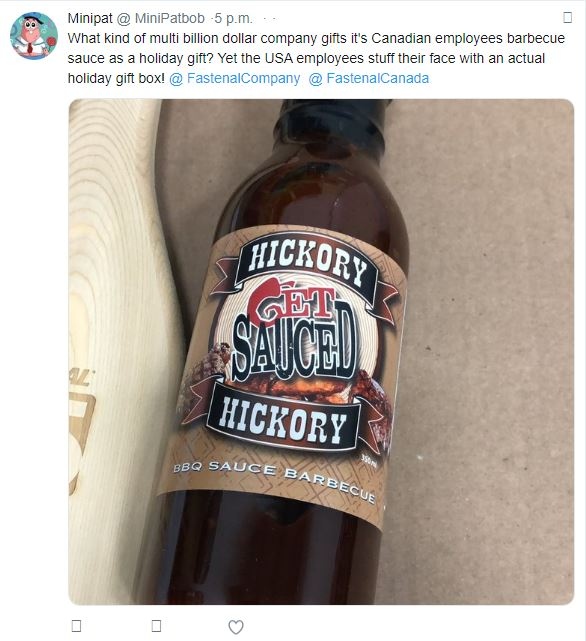Employee fired after angry tweet about BBQ sauce holiday gift

Termination for cause over BBQ sauce
A B.C. man claims he was fired from his job after he angrily tweeted about a $6 bottle of barbecue sauce he received as a Christmas gift from his employer.
27-year-old Hussien Mehaidli received the bottle of BBQ sauce, along with a wooden barbecue scraper, as a present from U.S.-based Fastenal. The company is a wholesaler of construction materials and operates throughout Canada.
Mehaidli had worked as a general manager at Fastenal for six years.
Mehaidli, who resides in Burnaby, told CTV News that in previous years, he and his coworkers were usually gifted a box of assorted food and goodies, including cookies and M&Ms, come the holiday season.
Mehaidli said he was disappointed by the gift, considering he had worked extremely hard to achieve his sales goals.
He decided to share his frustrations via an anonymous Twitter account.
“What kind of multi billion dollar company gifts it’s Canadian employees barbecue sauce as a holiday gift? Yet the USA employees stuff their face with an actual holiday gift box!” he tweeted, where he tagged both the Canadian and American Twitter handles for Fastenal.

The following day, Mehaidli told CTV News that he received a call from his manager, who told him to delete the tweet.
10 days later, on Dec. 30, the manager called him in for a meeting, where he was immediately fired.
Mehaidli was told that the decision was made by Fastenal’s U.S. operations. His exit interview letter explained that he was let go for “violation of standards of conduct policy — acceptable conduct section.”
Mehaidli was fired without severance pay. He was provided payment for unused vacation time, $741 in commission and his last paycheque.
Termination and severance pay from Fastenal
When an employee is let go from their job, they are either terminated “for cause” or without cause.
In a dismissal without cause, an employee can be let go for reasons that may be legitimate (i.e. they were fired due to poor work performance or a company’s decision to cut costs) or otherwise, but do not amount to issues involving significant workplace misconduct.
In fact, an employer can generally fire an employee for any reason, so long as that reason isn’t discriminatory and doesn’t violate the employee’s human rights.
When an employee is let go without cause, they are owed full common law severance pay, which is calculated based on factors that include age, length of service, position, and ability to find new employment.
Use our firm’s Severance Pay Calculator to get an idea of how much severance pay you might be owed.
In a termination for cause, an employer can fire an employee without severance pay, but only if they committed an act of severe workplace misconduct (such as theft or dishonesty).
Mehaidli’s legal rights and wrongful dismissal
In Mehaidli’s case, Fastenal was legally allowed to terminate his employment based solely on the fact that he posted a complaint about his employer on his anonymous Twitter account.
However, the company is still required to pay him his full severance entitlements.
Given the alleged contents of his exit letter and lack of a severance package, it appears that Fastenal incorrectly chose to terminate Mehaidli’s employment “for cause”.
Since his “crime” does not appear to rise to the level of gross misconduct, the company’s decision to fire him without severance pay was inappropriate.
The former general manager may have grounds to pursue a wrongful dismissal claim against his ex-employer.
With help from an employment lawyer, he can get the severance pay he is rightfully owed.
Negative comments on social media
Canadians should remember that when you post something negative about your workplace on social media, there is a good chance that your colleagues or employer may take notice — and take action.
While many people believe that are immune from punishment when they post on a personal account while off duty, the truth is quite the opposite.
Canadian employment laws and U.S.-based companies
Many people believe that employees working in Canada for U.S.-based companies are subject to American employment laws. This is simply not true.
This is a myth largely perpetuated by employers seeking to avoid their legal duties and responsibilities in jurisdictions including Ontario and British Columbia.
The fact is that American companies must adhere to the employment laws of the province or territory that they are operating in.
Where severance pay is concerned, employees must be provided severance based on employment standards minimums and the full amount under common law.
Comprehensive services for employees
The employment lawyers at Samfiru Tumarkin LLP have successfully represented thousands of non-unionized individuals in various regions across Ontario, Alberta, and B.C.
In addition to severance package negotiations, we can assist you on a broad range of employment matters, including:
For a comprehensive overview of employment, disability, and personal injury law, explore our Law Essentials page.
If you are a non-unionized employee who needs help with a workplace issue, contact us or call 1-855-821-5900 to get the advice you need and the compensation you deserve.




